Evaluating Country Programmes - OECD Online Bookshop
Evaluating Country Programmes - OECD Online Bookshop
Evaluating Country Programmes - OECD Online Bookshop
You also want an ePaper? Increase the reach of your titles
YUMPU automatically turns print PDFs into web optimized ePapers that Google loves.
<strong>Evaluating</strong> <strong>Country</strong> <strong>Programmes</strong><br />
126<br />
Gender<br />
Social relations in Tanzania are largely governed by patriarchy, which favours<br />
males as bread winners and females as household caretakers. This situation<br />
strengthened an ideology of male superiority and female and youth inferiority,<br />
which continues to influence work patterns, division of labour, particularly in agriculture,<br />
and access to education and skills. Results of a survey conducted in 1997<br />
showed: In the public sector, there were 14 women Executive Directors, 100 men;<br />
Court of Appeal Judges, 0 women, 5 men; District Commissioners, 18 women,<br />
79 men. In agriculture, women’s participation in food crop production was 75% compared<br />
to 25% for men.<br />
Although women produce between 60 and 80% of food and cash crops, land can<br />
only be inherited through the male children. The current land policy gives equal<br />
access to land for men and women provided it is outside defined clan land, denying<br />
the right to land ownership to large segments of the female population in rural<br />
areas. Enrolment in technical education records 6% women, 94% men; university<br />
education 21.8% women, 78.2% men. Women and youth performance in economic<br />
activities follow the same pattern. Patriarchy determines gender relations across<br />
the social strata.<br />
Patriarchal relations are also reflected in various bodies of Tanzanian Law,<br />
including the Constitution which guarantees equality to all people before the law<br />
but does not spell out age and gender. In many cases, statutory laws such as the<br />
Marriage Act and the Customary Law still provide rationale for patriarchal ideology<br />
and practise.<br />
SDC – Swiss country programme for Tanzania: Case study on methodological<br />
experiences in country programme evaluations (CPEs)<br />
Introduction<br />
The SDC in Tanzania has just entered into its third country programme (CP)<br />
period, i.e. 1999 – 2003. It is interesting to note that there were important dynamics<br />
in relation to methodologies as well as approaches used in reviews, evaluations<br />
and ultimate formulation of subsequent country programmes. The following is a<br />
brief outline of methodological experiences on CPEs in the SDC Tanzania covering<br />
the CP 1993 – 98 and CP 1999 – 2003. The outline has also incorporated partners‘<br />
responses to the SDC on metholology as well as on the initiative towards a partnership<br />
in development co-operation.<br />
The first SDC country programme for Tanzania was outlined in 1986, covering a<br />
period of six years to 1992. This CP was reviewed during the formulation of the second<br />
CP 1993 – 1998.<br />
<strong>OECD</strong> 1999






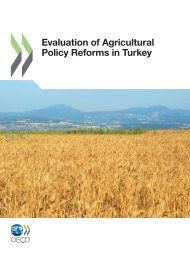
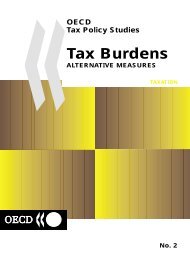

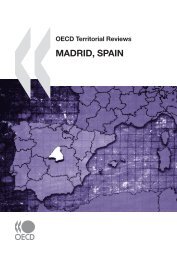



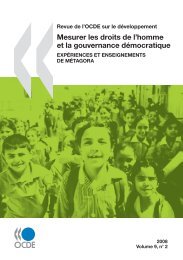
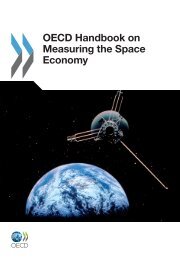
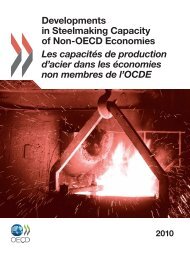

![CQE=U]^\]Z: KAZAKHSTAN - OECD Online Bookshop](https://img.yumpu.com/3915768/1/190x253/cqeuz-kazakhstan-oecd-online-bookshop.jpg?quality=85)